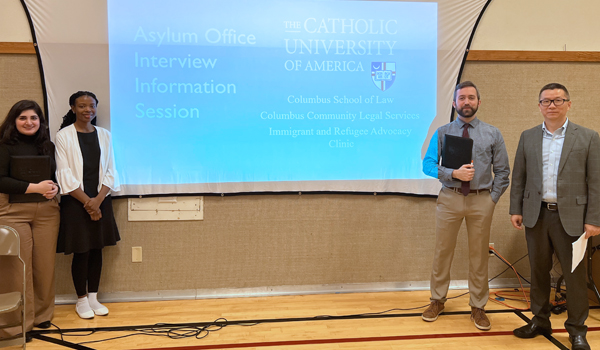 On November 1 and 9, Catholic Law’s Immigrant & Refugee Advocacy Clinic (IRAC) — in collaboration with the immigration clinics at American University Washington College of Law (WCL), Antonin Scalia Law School (ASLS) at George Mason University, and the Francis King Carey School of Law at University of Maryland (UMD) — held a series of no-cost information sessions for Afghan refugees navigating the United States asylum system without legal representation. Over 7,000 Afghans have resettled in the D.C. area since the Taliban took over. The need for immigration assistance is tremendous.
On November 1 and 9, Catholic Law’s Immigrant & Refugee Advocacy Clinic (IRAC) — in collaboration with the immigration clinics at American University Washington College of Law (WCL), Antonin Scalia Law School (ASLS) at George Mason University, and the Francis King Carey School of Law at University of Maryland (UMD) — held a series of no-cost information sessions for Afghan refugees navigating the United States asylum system without legal representation. Over 7,000 Afghans have resettled in the D.C. area since the Taliban took over. The need for immigration assistance is tremendous.
The work of the four legal institutions was based on discussions with local Afghan advocacy and refugee resettlement organizations including HIAS, Lutheran Social Services, and Project ANAR (Afghan Network for Advocacy & Resources). These community partners pinpointed specific needs in the local recently-arrived Afghan community. The goal of the workshops is to address the widespread needs of pro se asylum applicants (the number of which has increased dramatically since the Taliban took over the Afghan government in August 2021). Student attorneys addressed a critical need in a timely manner and are learning how they, as attorneys, can collaborate with legal and non-legal partners to advocate for justice. They also learned and applied key lawyering skills like interviewing, counseling, working with interpreters, and practicing cultural humility.
IRAC students presented to a total of 79 pro se Afghan asylum seekers during the course of the two workshops. These information sessions provided attendees with guidance on the asylum interview process and included engaging Q&A sessions. IRAC students also conducted mock asylum interviews with 6 of the asylum seekers in attendance, playing the role of Asylum Officers. In addition, IRAC provided all attendees with a traditional Afghan lunch.
Jocelyn Dyer, Visiting Clinical Assistant Professor for IRAC, shared, "This semester in IRAC we focused our case work on Afghan asylum claims, so the information sessions and mock interviews were a great opportunity for the students to share what they've learned with a community in need. IRAC will continue to collaborate with the other law school clinics and NGO partners this spring.”
